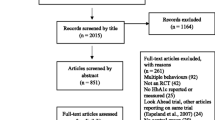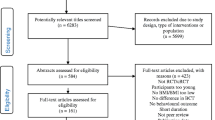Abstract
Effects of a cognitive behavioural treatment (CBT) in type 2 diabetes patients were studied in a randomised controlled trial. Patients were recruited from a diabetes care system (DCS). The intervention group (n = 76) received managed care from the DCS and CBT. The control group (n = 78) received managed care only. Effects on risk of developing coronary heart disease (CHD), clinical characteristics, lifestyle, determinants of behaviour change, quality of life, and depression were assessed after 6 and 12 months. The intervention did not result in a significant reduction of CHD risk (difference between intervention and control group was −0.32 % (95 % CI: −2.27; 1.63). The amount of heavy physical activity increased significantly in the intervention group at 6 months [intervention versus control group was 20.14 min/day (95 % CI: 4.6; 35.70)]. Quality of life and level of depression improved as well. All effects disappeared after 6 months. No effects were found on clinical characteristics.

Similar content being viewed by others
References
Ainsworth, B. E., Haskell, W. L., Whitt, M. C., Irwin, M. L., Swartz, A. M., Strath, S. J. et al. (2000). Compendium of physical activities: An update of activity codes and MET intensities. Medicine and Science in Sports and Exercise, 32, S498–S504. Retrieved from PM: 10993420.
Alam, R., Sturt, J., Lall, R., & Winkley, K. (2009). An updated meta-analysis to assess the effectiveness of psychological interventions delivered by psychological specialists and generalist clinicians on glycaemic control and on psychological status. Patient Education and Counseling, 75, 25–36. Abstract retrieved from http://linkinghub.elsevier.com/retrieve/pii/S0738399108004795?showall=true
Angermayr, L., Melchart, D., & Linde, K. (2010). Multifactorial lifestyle interventions in the primary and secondary prevention of cardiovascular disease and type 2 diabetes mellitus—A systematic review of randomized controlled trials. Annals of Behavioral Medicine, 40, 49–64. Retrieved from http://dx.doi.org/10.1007/s12160-010-9206-4
Bouma, M., Rutten, G. E., de Grauw, W. J., Wiersma, T., & Goudswaard, A. N. (2006). Summary of the practice guideline ‘Diabetes mellitus type 2’ (second revision) from the Dutch College of General Practitioners. Nederlands Tijdschrift voor Geneeskunde, 150, 2251–2256. Retrieved from PM: 17076359.
Brooks, R. (1996). EuroQol: The current state of play. Health Policy, 37, 53–72. Retrieved from PM: 10158943.
Brug, J., Lechner, L., & de Vries, H. (1995). Psychosocial determinants of fruit and vegetable consumption. Appetite, 25, 285–296. Retrieved from PM: 8746967.
Clark, M., Hampson, S. E., Avery, L., & Simpson, R. (2004). Effects of a tailored lifestyle self-management intervention in patients with type 2 diabetes. British Journal of Health Psychology, 9, 365–379.
de Vries, H., Backbier, E., Kok, G., & Dijkstra, M. (1995). The impact of social influences in the context of attitude, self-efficacy, intention and previous behavior as predictors of smoking onset. Journal Applied Social Psychology, 25, 237–257.
D’Zurilla, T. J., & Nezu, A. M. (2001). Problem-solving therapies. In K. S. Dobson (Ed.), Handbook of cognitive behavioral therapies (2 ed., pp. 211–245). New York: Guilford Press.
Franke, L. J., van Weel-Baumgarten, E. M., Lucassen, P. L., Beek, M. M., Mynors-Wallis, L., & van, W. C. (2007). Feasibility of training in problem-solving treatment for general practice registrars. The European Journal of General Practice, 13, 243–245. Retrieved from PM: 18324509.
Gaede, P., Vedel, P., Larsen, N., Jensen, G. V., Parving, H. H., & Pedersen, O. (2003). Multifactorial intervention and cardiovascular disease in patients with type 2 diabetes. New England Journal of Medicine, 348, 383–393. Retrieved from PM: 12556541.
Glasgow, R. E., Toobert, D. J., Barrera, M., Jr., & Strycker, L. A. (2004). Assessment of problem-solving: A key to successful diabetes self-management. Journal of Behavioral Medicine, 27, 477–490. Retrieved from PM: 15675636.
Hardeman, W., Sutton, S., Griffin, S., Johnston, M., White, A., Wareham, N. J. et al. (2005). A causal modelling approach to the development of theory-based behaviour change programmes for trial evaluation. Health Education Research, 20, 676–687. Retrieved from PM: 15781446.
Ismail, K., Winkley, K., & Rabe-Hesketh, S. (2004). Systematic review and meta-analysis of randomised controlled trials of psychological interventions to improve glycaemic control in patients with type 2 diabetes. Lancet, 363, 1589–1597. Retrieved from PM: 15145632.
Lustman, P. J., & Clouse, R. E. (2005). Depression in diabetic patients: The relationship between mood and glycemic control. Journal of Diabetes Complications, 19, 113–122. Retrieved from PM: 15745842.
Mynors-Wallis, L. M. (2005). Problem solving treatment for anxiety and depression. A pratical guide (1 ed.) Oxford: Oxford University Press.
Norris, S. L., Engelgau, M. M., & Narayan, K. M. (2001). Effectiveness of self-management training in type 2 diabetes: A systematic review of randomized controlled trials. Diabetes Care, 24, 561–587. Retrieved from PM: 11289485.
Norris, S. L., Zhang, X., Avenell, A., Gregg, E., Bowman, B., Serdula, M. et al. (2004). Long-term effectiveness of lifestyle and behavioral weight loss interventions in adults with type 2 diabetes: A meta-analysis. American Journal of Medicine, 117, 762–774. Retrieved from PM: 15541326.
Peyrot, M., & Rubin, R. R. (2007). Behavioral and psychosocial interventions in diabetes: A conceptual review. Diabetes Care, 30, 2433–2440. Retrieved from PM: 17666457.
Radloff, L. S. (1977). The CES-D scale: A self-reported depression scale for research in the general population. Appl Psych Meas, 1, 385–401.
Spahn, J. M., Reeves, R. S., Keim, K. S., Laquatra, I., Kellogg, M., Jortberg, B. et al. (2010). State of the evidence regarding behavior change theories and strategies in nutrition counseling to facilitate health and food behavior change. Journal of the American Dietetic Association, 110, 879–891. Abstract retrieved from http://linkinghub.elsevier.com/retrieve/pii/S0002822310002415?showall=true
Steed, L., Lankester, J., Barnard, M., Earle, K., Hurel, S., & Newman, S. (2005). Evaluation of the UCL diabetes self-management programme (UCL-DSMP): A randomized controlled trial. Journal Health Psychology, 10, 261–276. Retrieved from PM: 15723895.
Stevens, R. J., Kothari, V., Adler, A. I., & Stratton, I. M. (2001). The UKPDS risk engine: A model for the risk of coronary heart disease in Type II diabetes (UKPDS 56). Clinical Science (London), 101, 671–679. Erratum in: Clin Sci (Lond) 2002, 102: 679. Retrieved from PM: 11724655.
Thoolen, B. J., de Ridder, D. T., Bensing, J. M., Maas, C., Griffin, S., Gorter, K. J., et al. (2007). Effectiveness of a self-management intervention in patients with screen-detected type 2 diabetes. Diabetes Care, 30, 2832–2837.
Van Strien, T., Frijters, J. E. R., Bergers, G. P. A., & Defares, P. B. (1986). The dutch eating behaviour questionnaire (DEBQ) for assessment of restrained, emotional and external eating behaviour. International Journal of Eating Disorders, 5, 295–315.
Welschen, L. M., Bot, S. D., Dekker, J. M., Stalman, W. A., & Nijpels, G. (2006). The implementation of a diabetes care system: A prospective observational 8-years follow-up study. Diabetologia, 49, 142.
Welschen, L. M., van Oppen, P., Dekker, J. M., Bouter, L. M., Stalman, W. A., & Nijpels, G. (2007). The effectiveness of adding cognitive behavioural therapy aimed at changing lifestyle to managed diabetes care for patients with type 2 diabetes: Design of a randomised controlled trial. BMC Public Health, 7, 74. Retrieved from PM: 17488511.
Wendel-Vos, G. C., Schuit, A. J., Saris, W. H., & Kromhout, D. (2003). Reproducibility and relative validity of the short questionnaire to assess health-enhancing physical activity. Journal of Clinical Epidemiology, 56, 1163–1169. Retrieved from PM: 14680666.
Acknowledgments
We would like to thank all diabetes nurses, dieticians, and research assistants that were involved in the study. We also would like to thank Tootje Hoovers and Jolanda Bosman for taking care of the organization of the study within the Diabetes Care System West-Friesland. In addition, we would like to thank Wendy Hardeman for her comments on the study design during the development of the intervention. The study was funded by the EMGO Institute for Health and Care Research, VU University Medical Center, Amsterdam, the Netherlands.
Author information
Authors and Affiliations
Corresponding author
Rights and permissions
About this article
Cite this article
Welschen, L.M.C., van Oppen, P., Bot, S.D.M. et al. Effects of a cognitive behavioural treatment in patients with type 2 diabetes when added to managed care; a randomised controlled trial. J Behav Med 36, 556–566 (2013). https://doi.org/10.1007/s10865-012-9451-z
Received:
Accepted:
Published:
Issue Date:
DOI: https://doi.org/10.1007/s10865-012-9451-z




